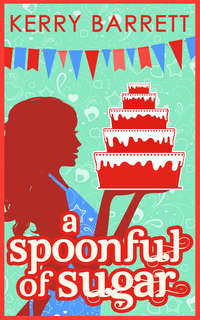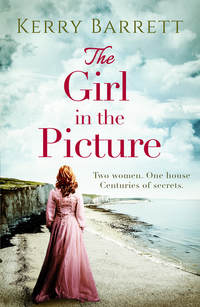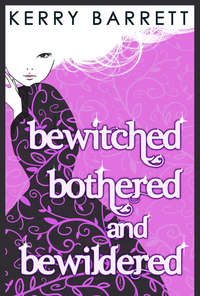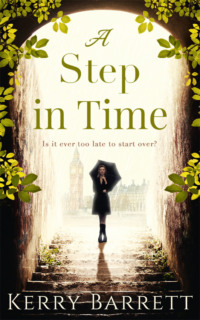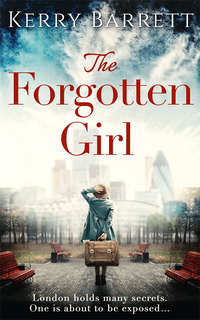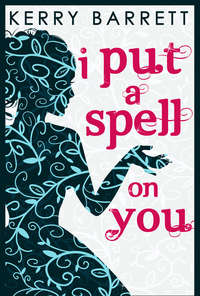
Полная версия
The Secret Letter
She took my hand. ‘You’ve been through an ordeal,’ she said, her reading glasses slipping down her nose. ‘I believe it would be good for your own peace of mind to share your experiences.’
I nodded. ‘That is true. It always helps me to write things down.’
‘It would certainly be good for others to read about them. So they’re prepared, if needs be.’
She pushed the typewriter towards me.
‘You want me to do it now?’
She held out a piece of paper and slowly I fed it into the typewriter.
‘I shall do my best,’ I said.
Agnes smiled at me. ‘That’s all I can ask.’
Chapter 10
Esther
The next day should have been my day off again but after church I found I couldn’t settle to anything. It was a glorious spring day and I wanted to be outside so I put my book to one side and went to find the children to see if they wanted a walk.
The idea was met with a great deal of enthusiasm so we all pulled on boots and hats, and went out to the park. They liked going to the ponds to see the ducks so we headed in that direction, the children running ahead and me walking more sedately behind, feeling the weak sun on my face and revelling in the fresh air. I felt at peace, for the first time in weeks, and also determined.
Last night’s meeting had been astonishing. I’d spent the afternoon writing about my time in Holloway and when Agnes read what I’d written, her face had gone pale.
‘How awful,’ she’d said.
‘It was certainly no fun but I didn’t have it bad, compared to some. I had only just started my hunger strike when I was released so I’d only suffered being forcibly fed once. But believe me that was enough.’ I’d felt bile rise in my throat at the awful memory and had to take a moment to swallow before I could carry on. ‘My friend Minnie went through it twice and it was much worse the second time. She was in a bad way.’
‘Well, I’m very pleased you are sharing your thoughts,’ she’d said.
And at the meeting she had stood up and introduced me.
‘This young woman is Esther Watkins,’ she had said. ‘She was recently in Holloway and I would like her to tell you all a little about her experiences there.’
I’d spoken slowly at first about prison. I’d told them about the women I’d met, and how we were treated.
‘I still dream I’m there,’ I’d said. ‘I wake up in the morning not sure where I am. And I think about the women I met in there all the time. I wonder how they’re getting on – the ones who stayed longer – and I find myself looking at the clock and thinking they’ll be sending round supper now. Or wondering if Mrs Flintoff has recovered from her cold, or if Miss Bolton has managed to sleep through a whole night without a bad dream.’
‘Are you frightened you’ll go back?’ one woman had asked me.
I’d thought for a moment. ‘No,’ I’d said. ‘I don’t want to go back but if I have to, then I will. Because this is important. Women are not second-class citizens, to mop up men’s mess and do their bidding. Not any more.’ I’d looked around the room at the women. ‘They’re the ones who are scared,’ I’d said. ‘Not us. They’re scared that giving us a voice means things are going to change. And they’re scared because they know we’re right.’
Some of the women had cheered and suddenly I’d felt bolder.
‘I’m frightened of going to jail again, but I’m not stopping.’
They’d cheered again and I’d sat down feeling buoyed up by their support. I was a part of something, I’d thought. A part of something very important.
But later in the meeting, while someone else was talking, things had taken a turn. I was suddenly aware of a flurry of noise and movement at the back of the hall as women got to their feet.
‘Is there a problem?’ the woman on stage had called. But no one had answered. I’d stood up, trying to see what was wrong. Next to me another woman had shrieked.
‘Rats,’ she’d gasped. ‘There are rats in the hall.’ She’d clambered on to her chair and others followed.
At the back of the hall, someone had thrown the doors open and women had begun streaming outside.
Bewildered I’d looked round and saw to my horror that the woman on the chair was right. There were several large brown rats scuttling along the floor in the hall. They were darting this way and that under the chairs, while women had held their skirts up, trying to avoid them.
Agnes had been next to me, looking disgusted.
I’d clutched her arm. ‘Shall we go?’
‘Please.’
We’d both hitched up our skirts and – grateful that we were sitting towards the back of the hall – we’d made a dash for the door.
Outside, and across the road, we’d shaken out our skirts.
‘Ugh, I feel dirty,’ Agnes had said. ‘How on earth did that happen? We’ve used that hall often and never seen vermin before.’
‘Someone put them there,’ a passing suffragette had said, still holding her dress up above her knees. ‘Heard about it happening a few times in Manchester.’
‘Who would do such a thing?’ The hatred we drew was nothing new, but it still shocked me every time I experienced it.
She’d shrugged. ‘Coppers?’
‘Miss Whitehouse?’
Startled out of my memories of the rat-infested meeting, I almost ignored the voice behind me, until it said again: ‘Miss Whitehouse?’ and I remembered the false name I’d given the young man who’d helped me to my feet last week.
I turned to see Joseph Fairbanks – I found I had no trouble remembering his name – grinning at me. My heart – my foolish heart – gave a flutter as I looked at his handsome face and I cursed myself inwardly. All this talk of women being equal to men, and there was I going giddy at the first sight of a crooked smile and friendly blue eyes …
‘How lovely to see you,’ Joseph said.
For the first time I noticed he was wearing his police constable uniform, holding his hat under his arm, and I felt a rush of something. Fear? Trepidation? My only dealings with constables had not been good and the horror of the rats in the meeting was still raw. Despite Joseph’s smile and handsome face, and my absolute certainty that he was a good man unlike some of the others I’d come across, I found I wanted to spin on my heels and run away.
But instead, I nodded politely. ‘Likewise.’
‘Enjoying the spring sunshine?’
‘Indeed.’
‘It seems a shame to walk alone,’ he began, but he stopped as Meg skipped up to me.
‘Esther, we have found a patch of daffodils, which means winter is truly gone now – come and see.’
She tugged at my skirt and I smiled down at her, happy both at her enthusiasm and that she had given me an excuse to leave.
‘One moment, Meg,’ I said and she darted off again.
‘Not alone then?’
I smiled, properly this time. This truly was a nice man. Not someone to fear. Someone, in fact, I felt I liked although we’d only met recently.
‘I’m a governess,’ I said. ‘I’m not sure I am ever alone.’
Joseph laughed and his whole face lit up. ‘I’ve got four brothers,’ he said. ‘I know how that feels.’
‘I should go and admire the daffodils.’
‘And I should get to work.’
We smiled at each other again and I felt a pull towards him. I may have been twenty-one years old, but I’d never had a romance. Some of the girls I’d known at school were married already but I’d been so busy dealing with my father’s death and the mess he’d left behind and then getting involved with the WSPU, that I’d not really had time to think about finding myself a suitor.
‘Until next time,’ he said.
He sauntered off down the path, spinning his hat on his hand as he went.
I watched him go, thinking – somewhat wistfully – that if things were different, and he wasn’t a policeman and I wasn’t, well a criminal in the eyes of the law, then perhaps we could have spent some time together.
But instead, I went to find Meg and the daffodils, which were indeed very lovely and I thought about what to say to Agnes if Meg mentioned me chatting with a constable in the park.
We’d not been home five minutes before Meg brought it up, just as I knew she would. She was a bright little girl and she was endlessly fascinated by people.
‘Esther was talking to a friend in the park,’ she said to her mother as she wrestled off her boots. ‘A man.’
Agnes looked at me with raised eyebrows. ‘A man? Is that so?’
I braced myself, waiting for her to say he was a policeman. Like me, most of the suffragettes did not think much of the constables who were a thorn in all our sides. Agnes would not be happy about me chatting with one, I thought. Especially after last night.
‘Yes,’ Meg said looking rather too pleased with herself. Here it came. She was surely about to announce he had been wearing a uniform. But it seemed that wasn’t what had interested my charge about my exchange with Joseph Fairbanks – she’d been watching me instead.
‘Esther did laugh a lot, and she tilted her head on the side when she talked so the whole world must have looked the wrong way around.’
‘Meg,’ I said, embarrassed, but Agnes just chuckled and Meg was undeterred.
‘And Esther’s cheeks were all red like they are now.’
I put my cool hands to my face. She was right, the wretched child. My cheeks were flaming.
‘Edie has made lunch for you all in the kitchen,’ Agnes said, dropping a kiss on Meg’s head. ‘Go on.’
The children raced off for their food and I busied myself gathering their boots to take upstairs.
‘Oh leave all that for now,’ Agnes said. ‘Come and have tea and tell me all about this handsome chap you’ve been chatting to.’
To my surprise, I discovered I had quite a lot to say about Joseph.
‘I met him the other day when I fell over on my way to Mrs Pankhurst’s house,’ I told Agnes. ‘He picked me up and brushed me off.’
‘He picked you up,’ she repeated, delighted.
‘He did.’ I paused. ‘He was nice. Another man stepped over me and trod on my petticoat but he stopped to help.’
‘A gentleman.’
‘Handsome, too.’
‘So that’s why your cheeks were red,’ she teased and I felt myself blush again.
Agnes clapped her hands. ‘It’s like a fairy story,’ she said. ‘You fell over and he fell in love.’
‘Heavens, Agnes, no. You are getting ahead of yourself.’
‘Don’t pretend you’re not interested.’
I tried to look indifferent but I failed. ‘He’s nice,’ I admitted. ‘I like him.’
‘I knew it!’
‘But this is all stuff and nonsense,’ I said. ‘Nothing will come of it. Goodness, I’m so busy with the WSPU business, and the newspaper, and the children …’
Not to mention the fact that he was a policeman and there was no way a constable could even entertain the idea of romance with a woman like me. No way at all. I shook my head vigorously.
‘No,’ I said. ‘I am committed to the cause.’
‘Some men are allies to the cause,’ Agnes pointed out. ‘My John, for one.’
‘Your John is a treasure. But he is far from the norm.’
I wondered if it was possible that PC Fairbanks could be a secret supporter of women’s suffrage. Perhaps. He seemed to be such a nice chap. Surely he would be able to see the reason behind our arguments? Though that didn’t mean he could suddenly start spending time with suffragettes.
‘Anyway, whether he is an ally or not, I have no time for male attention.’
‘Really?’ Agnes said, disappointed.
I was firm. ‘Really.’
Chapter 11
Lizzie
2019
I knew that telling the staff that the council intended to close Elm Heath Primary would be terrible. I thought it would be one of the worst things I’d ever had to do.
When the shit hit the fan in Clapham it had been bad, but at the start I’d been absolutely certain that it was all a big mistake and that Grant would never have done the things they said he’d done.
Of course, I’d been wrong, which had made the whole thing even worse, but I didn’t know that at the beginning, even if I started to have some niggling doubts later on.
But the way I’d felt that day when Grant told me he’d been suspended while they investigated some “inconsistencies”’ was nothing compared to the way I felt just imagining the expressions on the faces of the Elm Heath staff.
And so, I decided not to tell them.
‘They’ll just start looking for another job,’ I reasoned with myself. ‘Or they’ll blame me and make things difficult. It’s better if they don’t know yet.’
Instead, at the end of the school day, I took Paula into my office and shut the door on Emma, who was pretending to be absorbed in putting her coat on and absolutely not listening to what we were saying.
‘What’s all this?’ Paula said, looking alarmed. ‘Bad news?’
‘The worst.’
The colour drained from her face and she sat down heavily, looking like the air had been knocked out of her.
‘They’re closing Elm Heath?’
I nodded.
‘I never thought they’d actually do it.’
‘It’s not definite yet.’ I was eager to reassure her, because I couldn’t bear to see how bereft she looked. ‘That’s why I’m only telling you for now – not everyone else.’
She shrugged. ‘What can we do? I know how these things work – once a decision has been made, it’s made.’
‘Not necessarily,’ I said, but my protests sounded weak to my own ears. ‘I spoke to Denise Deacon at the council and she said it wasn’t signed off yet. It’s not official.’
Paula looked up at me, a tiny glimmer of hope in her eyes. ‘What exactly did she say?’
I thought for a moment. ‘She said it was a shame and she wished the school could stay open. I got the impression she’s on our side, thought she couldn’t really say so outright.’
Paula nodded. ‘And?’
‘She said we had to be creative and prove that Elm Heath was a vital part of the community, or that it was of special interest. We’ve got some time – and I’ve had a few ideas.’
‘Hit me,’ Paula said.
I found my scribbled notes and took her through what I’d come up with so far and she listened intently, her mind obviously racing with her own ideas.
‘My friend Joanna is a personal trainer,’ she said. ‘I bet she knows loads of fitness instructors who might want to use the hall. I’ll put the word out. If we’re smart we could get someone hiring it every evening and that will definitely help the budget.’
I nodded, pleased she’d got on board so fast.
‘And I absolutely love the idea of bringing the kids and the elderly people together.’
‘I don’t think that will be a money-making idea really but it will prove we’re important in the community, which is also part of the plan.’
‘And the after-school club will do both,’ Paula said triumphantly.
‘I hope so. I’m surprised you don’t do one already.’
She grimaced. ‘Like I said, we got a bit stuck in our ways. We’d need someone to run it though.’
‘I had an idea about that, too.’
‘You’re on fire today.’
I grinned. ‘What about Sophie Albert?’
Paula clapped her hands. ‘That’s a fabulous idea. She knows all the kids anyway, and she’s got her DBS checks because she’s often helping out at school things.’ She thought for a moment. ‘And I think I’d ask Celeste to coordinate from our side. She’s very organised and she is keen to have a new challenge. Might encourage her to stay.’
‘Great,’ I said. ‘That’s sorted then. I’ll chat to Celeste and Sophie. Could you and Pippa take on the afternoon teas for the elderly people? Maybe speak to some daycentres or whatever? If they work well with the little children, we can extend it to the older ones.’
‘On it,’ Paula said.
I ran my fingers through my hair. ‘I just hope it works,’ I said. ‘Denise seemed to think it was a start rather than a solution. She sounded quite downbeat about it all.’
‘I really believed that once we had you at the helm we’d be fine,’ Paula said, almost to herself.
‘I did worry that this was because of me. That the axe is falling while I’m here, because of what happened,’ I admitted out loud for the first time, my mood going from positive to negative in record speed.
‘At your old school you mean?’
I nodded.
‘Absolute rubbish,’ Paula said firmly. ‘They were fully up to speed with everything that happened when they offered you the job.’
‘I s’pose,’ I muttered.
Paula fixed me with the stern glare that made unruly children quake. ‘You need to stop feeling guilty about something you didn’t do.’
‘I s’pose,’ I muttered again.
There was a pause. I played with the edge of the desk, wondering what to say next.
‘What did you mean when you said interest?’ Paula said.
‘Pardon me?’
‘You said we had to prove the school was of special interest. What kind of interest?’
‘Well, Denise suggested historical, because I mentioned how old it was,’ I said. ‘But anything I suppose.’
‘Right,’ Paula said, fire in her eyes.
‘Do you have an idea?’
‘What about Esther?’ she said, gesturing to the photograph on my wall.
‘I’m a step ahead of you there. But that’s not going to work.’
‘Why not?’
‘Because,’ I said. ‘I googled old butter-wouldn’t-melt Esther Watkins and discovered she was a criminal, that’s why.’
Paula stared at me. ‘I don’t think so.’
‘Google doesn’t lie.’
She raised an eyebrow at me.
‘Okay, Google sometimes lies, but the dates match up. I’m pretty sure it’s the same woman.’
Paula didn’t speak; she just looked so upset that I felt bad all over again.
‘Look,’ I said. ‘Let me do a bit more research. Maybe it’s not her. It does sound pretty unlikely.’
‘It does, doesn’t it?’
‘Why would a middle-class schoolteacher go to prison?’
‘Exactly.’
Paula looked at her watch and grimaced. ‘I have to go,’ she said. ‘Keep me posted on anything you discover?’
‘I will.’
Looking harassed, she hurried out of my office, leaving me alone. I looked out of the window at the autumn sunshine. All my best thinking used to be done while I was out walking. And when Grant’s actions made my whole life fall apart, I’d power my way round the commons of south London, working out solutions in my head. I’d go for a walk, I decided, and perhaps inspiration would strike.
As I left the school grounds, and pulled on my denim jacket though, I realised I was stumped. Back in London, I’d head to Wandsworth Common, or Tooting Common and follow the path round. But here in the countryside, I realised, I had no idea where to go. There was so much open space but I wasn’t sure if I was allowed to walk there. Surely the fields all belonged to people? Were there footpaths across them? How would I know? What if there were animals? I wasn’t keen on animals – I mostly just liked them from a distance. Especially scary ones like bulls.
Behind the playground was a patch of waste ground with the remains of a building on it and a broken fence. I’d seen teenagers out there in the evening, chatting and watching stuff on their phones, but it didn’t look like somewhere I wanted to be.
Beyond that was a neatly hedged field. I eyed it suspiciously. I couldn’t see a bull, but that didn’t mean there wasn’t one there.
Making up my mind, I crossed the road and headed instead to the park. It was only small, with a couple of football goals, and a little fenced-in play area, but I could walk round that without fear of being gored and hopefully clear my head a bit.
I’d only gone a little way round the edge of the park when my energy deserted me and I sat down on a bench, watching the kids running round the play area. I was at a loss about what to do for the best. The ideas we had were good but I wasn’t stupid. I knew they were a drop in the ocean compared to our falling admissions and the squeeze on education budgets. It seemed like an impossible task to save Elm Heath Primary, but it also seemed really important.
The old me would have relished this challenge. She’d have swooped in like a super-teacher, told everyone what to do to improve results and foster a growth mindset in all the pupils, and then swooped off again. But my confidence in my own abilities had deserted me, and this was all just too … huge.
‘You look like you have the weight of the world on your shoulders,’ said a voice. I looked up to see Danny Kinsella smiling at me.
To my surprise, my heart jumped at the sight of him. Just a bit.
‘School stuff,’ I said.
He sat down next to me. ‘Spill.’
‘I can’t.’
He pinched his lips together tight and made a zipping gesture. ‘I’m the soul of discretion, me,’ he said. ‘And if there’s anything I’ve learned over the years, it’s that a problem shared really is a problem halved.’
I looked at him. ‘You have to promise not to tell anyone,’ I said. ‘Not Cara and definitely not Sophie.’
‘Sophie ignores everything I say anyway.’
‘Promise,’ I said.
Danny looked at me gravely and held out his little finger. ‘Pinkie promise.’
‘Danny …’
‘It’s the most binding promise there is, according to Cara.’
Feeling faintly ridiculous, I linked my little finger with his. His hands were warm and soft.
‘There,’ he said, shaking. ‘Now you can tell me everything.’
And so I did. I told him all about Denise Deacon telling me the school would close unless we could do something to stop it, and about the ideas we’d had. It felt good to unburden.
‘Those are all great plans,’ he said. ‘Sophie’s the perfect person to run the after-school club.’
‘It’s not enough though, is it?’
He shrugged. ‘Possibly not. But it’s a start.’
‘I also had the idea of proving the school was of historical interest, so I looked up Esther Watkins, who founded it back in 1912, and discovered she was a criminal.’
‘What?’ said Danny, delighted. But I wasn’t happy.
‘I feel like I’ve hit a brick wall,’ I said. ‘I can’t tell the rest of the staff because they’ll just look for other jobs and we’ll be left with no one. Paula’s devastated. And the one thing I thought might help – our history – is a non-starter.’
Конец ознакомительного фрагмента.
Текст предоставлен ООО «ЛитРес».
Прочитайте эту книгу целиком, купив полную легальную версию на ЛитРес.
Безопасно оплатить книгу можно банковской картой Visa, MasterCard, Maestro, со счета мобильного телефона, с платежного терминала, в салоне МТС или Связной, через PayPal, WebMoney, Яндекс.Деньги, QIWI Кошелек, бонусными картами или другим удобным Вам способом.


